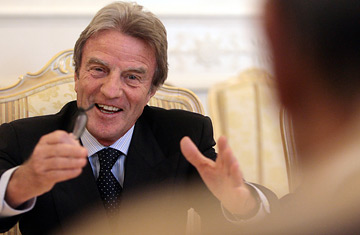
French Foreign Minister Bernard Kouchner
Since taking office last May, French President Nicolas Sarkozy has repeatedly shown that he wants to make France a major mover in international affairs again — and that a key part of that effort is to repair Franco-American relations undermined by the war in Iraq. But to his critics in France and abroad, Sarkozy's reinvigorated Atlanticism looks disturbingly similar to the views of Washington hard-liners, including those hankering for a military strike to take out Iran's nuclear development program. On Sept. 16, French Foreign Minister Bernard Kouchner warned that the international community had to "prepare for the worst" in its negotiations with Tehran — and that "the worst is war." That declaration came just one month after Sarkozy himself offered his own stark assessment of the two choices at hand — "an Iranian bomb and a bombardment of Iran" — should negotiations with Tehran fail.
Critics of such tough talk point to Iraq as evidence that diplomatic swagger can lead policy astray. "We mustn't send the wrong signs to the Bush Administration; it doesn't need us to be encouraged towards war," sarcastically warned former French Prime Minister Dominique de Villepin, whose impassioned anti-invasion speech at the United Nations in February 2003 gave wings to his political career before Sarkozy's ascent stymied it. "There are rules on how to use force," concurred Mohamed ElBaradei, head of the International Atomic Energy Agency, which leads negotiations with Tehran. "I would hope that everybody would have gotten the lesson after the Iraq situation, where 700,000 innocent civilians have lost their lives on the suspicion that a country has nuclear weapons."
Others suggest that Sarkozy and Kouchner (who has since stressed that "everything should be done to avoid war") are not just posturing, but really do believe that time is short before the unwanted military option becomes inevitable for Iran. "The problem is that the Iranian leadership likes to believe the military option isn't open to the U.S. while it's tied up in Iraq with an unpopular war," explains François Heisbourg, special advisor to the Foundation for Strategic Studies in Paris. "Sarkozy and Kouchner are trying to tell them, 'Yes, it is. Believe it and fear it as much we do. Only you can prevent it.'" The French government's alarm directed not towards Tehran alone, but also towards Russia and China, whose support for tougher sanctions is viewed as vital in pressing Iran to renounce its program. But the message doesn't appear to have changed minds in Moscow, where Russian Deputy Foreign Minister Alexander Losyukov reiterated his government's position that a "bombing of Iran would be a bad move that would end with catastrophic consequences."
